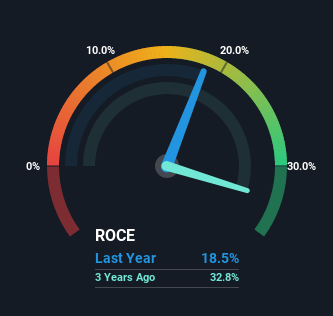Rockwell Automation (NYSE:ROK) Hasn't Managed To Accelerate Its Returns
If we want to find a potential multi-bagger, often there are underlying trends that can provide clues. In a perfect world, we'd like to see a company investing more capital into its business and ideally the returns earned from that capital are also increasing. Put simply, these types of businesses are compounding machines, meaning they are continually reinvesting their earnings at ever-higher rates of return. That's why when we briefly looked at Rockwell Automation's (NYSE:ROK) ROCE trend, we were pretty happy with what we saw.
Return On Capital Employed (ROCE): What Is It?
Just to clarify if you're unsure, ROCE is a metric for evaluating how much pre-tax income (in percentage terms) a company earns on the capital invested in its business. Analysts use this formula to calculate it for Rockwell Automation:
Return on Capital Employed = Earnings Before Interest and Tax (EBIT) ÷ (Total Assets - Current Liabilities)
0.19 = US$1.3b ÷ (US$11b - US$3.6b) (Based on the trailing twelve months to September 2022).
Thus, Rockwell Automation has an ROCE of 19%. In absolute terms, that's a satisfactory return, but compared to the Electrical industry average of 10% it's much better.
See our latest analysis for Rockwell Automation
Above you can see how the current ROCE for Rockwell Automation compares to its prior returns on capital, but there's only so much you can tell from the past. If you're interested, you can view the analysts predictions in our free report on analyst forecasts for the company.
What Can We Tell From Rockwell Automation's ROCE Trend?
While the current returns on capital are decent, they haven't changed much. The company has consistently earned 19% for the last five years, and the capital employed within the business has risen 43% in that time. Since 19% is a moderate ROCE though, it's good to see a business can continue to reinvest at these decent rates of return. Stable returns in this ballpark can be unexciting, but if they can be maintained over the long run, they often provide nice rewards to shareholders.
The Key Takeaway
The main thing to remember is that Rockwell Automation has proven its ability to continually reinvest at respectable rates of return. However, over the last five years, the stock has only delivered a 39% return to shareholders who held over that period. So to determine if Rockwell Automation is a multi-bagger going forward, we'd suggest digging deeper into the company's other fundamentals.
On a separate note, we've found 2 warning signs for Rockwell Automation you'll probably want to know about.
For those who like to invest in solid companies, check out this free list of companies with solid balance sheets and high returns on equity.
Have feedback on this article? Concerned about the content? Get in touch with us directly. Alternatively, email editorial-team (at) simplywallst.com.
This article by Simply Wall St is general in nature. We provide commentary based on historical data and analyst forecasts only using an unbiased methodology and our articles are not intended to be financial advice. It does not constitute a recommendation to buy or sell any stock, and does not take account of your objectives, or your financial situation. We aim to bring you long-term focused analysis driven by fundamental data. Note that our analysis may not factor in the latest price-sensitive company announcements or qualitative material. Simply Wall St has no position in any stocks mentioned.
Join A Paid User Research Session
You’ll receive a US$30 Amazon Gift card for 1 hour of your time while helping us build better investing tools for the individual investors like yourself. Sign up here

